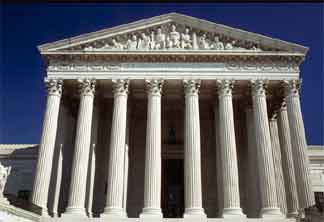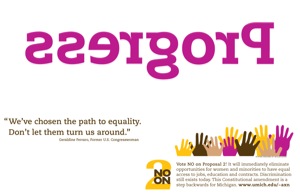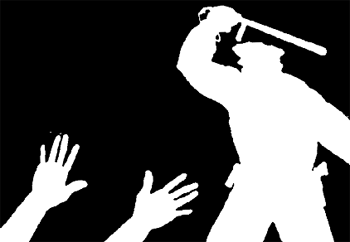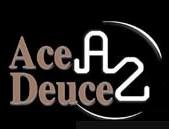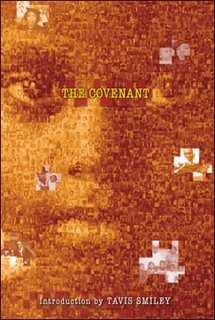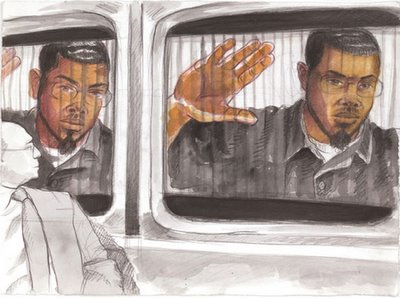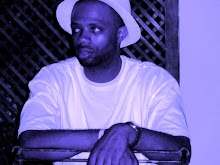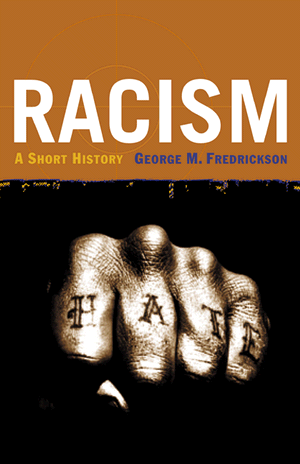
"I'm not a racist." Another variation on it is often, "I'm not a racist but..." or better yet, "Are you trying to say I'm a racist?" All three of these things are beginning to make me literally sick to my stomach. A few weeks back Michael Richards' outburst set the blogosphere on fire, which in turn set the media a fire, which in turn drove Richards to say, "The funny thing is, I'm not a racist." Well to Mr. Richards and all others who utter these words, I have one simple comment, "Yes, (fill in name here), you are a racist." Many folks get jarred by this statement, so read it again in the "Yes, Virginia, there is a Santa Claus" tone. Does that help you stomach it?
I tend to let my mind ferment during the evening by watching reality TV or playing my Nintendo DS (oh it's so great!). Tonight, I opted for Reality TV. I decided to watch the Real World Denver (no I don't think I have a real reason to watch this trash, but I did). Tonight's episode was yet another "big race episode" (this reminds me of when they would say things like, "Next week, a very special Webster" remember that? I digress). The characters end up in a tussle and the N word is barked by a drunken White male, Davis, within earshot of at least one Black roommate. I'll summarize so you don't have to watch the episode, they (producers) take the White roommate away for the night to a hotel and he returns the next day so the cast can talk it out. The result, the Black roommates forgive him and he says... you guessed it, "I'm not racist." One Black roommate Tyrie asked him (and I paraphrase) "So I just want to know, when you used that word. Where did it come from? Is that something you've been thinking or did it come out of anger or...?" Davis quickly responded, "Out of anger." This was particularly important to me because I knew once Tyrie gave him an "out" - mentioning anger, he would immediately jump at that reason. The episode closes with the Black roommates forgiving him and Davis staying so he can show them he can "watch what he says" and "he's not a racist." Dammit, you are a racist!
Now if any of you reading have had the pleasure (or pain) of sitting in on one of my guest lectures on race and ethnicity you know about this. Towards the beginning of the lecture I have all the people in attendance point to their neighbor and say, "You're a racist" and then have them point to their other neighbor and say, "You're a racist." After people follow in a
Pavlovian style they usually look back at me, half of them with some form of pissed expression. I then allay their fears by saying, "Now that everyone has been called a racist and called at least one person a racist, we can stop being scared of being labeled a racist." The label racist is avoided like Jehovah's Witness' on a Saturday morning.
Now being the good sociologist that I am, I know that is because most people associate racism with individual deliberate actions towards someone of a subordinate group that are meant to harm and are based on prejudice. Which really means that nobody wants to be considered a Klan member (well except of course Klan members who are out of the closet). That's the big problem, when I'm in a room of over 150 people and I ask, "Who is a racist?" and maybe one or two people raise their hands, we have a problem!!! The problem is not anger, the problem is not drunkeness, the problem is not hecklers and losing our cool, it's racism! I know you want a nice out or absolution, I know you want to prove you're not that bad word, but dammit you gotta claim it to change it.
Imagine this, you go the doctor, you ask him about a piercing headache you keep on having. The headache is usually bearable but on occasion it causes you to yelp in pain for others to hear. The doctor takes does a full exam, xrays, scans, etc. and sees you have a tumor on your brain. When the doctor comes back to talk to you and you ask the doc, "Am I alright?" The doc responds, "You have a cold." A cold, hell nawh you have cancer!!! Racism is a disease, one that needs to be addressed. Unfortunately everyday we ask the world not to label ourselves or others as racist, which drives us further away from curing the sickness of racism. A doctor who prescribed Ludens to you (you know those cough drops you always wanted because they tasted like candy but your momma wouldn't let you have them) instead of chemo would be in serious malpractice and in violation of the their oath. But everyday, people ask me, "Why do we have to say someone is racist?" "Can't we call it something else? or "I get what you're saying, but calling someone a racist is ugly." Racism is ugly!!! I could go into my definition of racism but here is a link to a
basic definition of racism that should get you started. If you're already with me, read on.
For me, dropping the term racist from our lexicon weakens our ability to call everyone to the task of being accountable for inequality. Admittedly not all inequality is racial, but many of the social ills that we see have a strong racial component. To borrow from Beverly Tatum racism is like pollution, you may not have started it, but you must live with it and everyday your actions contribute to it. The true question is what are you going to do to reduce it? By ignoring racism and the people and institutions that perpetuate it, we retard social progress. Because we have dropped racist from our lexicon, racial discrimination (disproportionate impact) does not legally exist until
animus is demonstrated. Because we stopped calling out people as being racist, the very people who support systems of oppression now label us racists. Because racist became perverted, some are now distorted enough to think the
oppressed are the oppressors.
I know this getting way too long, but let me conclude by saying, we live in a world without racists, but in a world full of racism. While I am forgiving, reasonable, and solution oriented, it disturbs me to see us sidestep the root of the hatred that we see in the disparate worlds we live in and in the malice ridden words we speak. I'd rather have chemo than candy. Wouldn't you?



